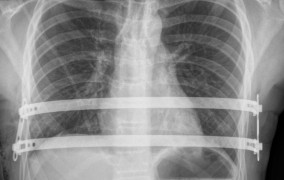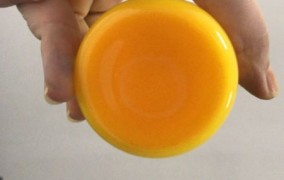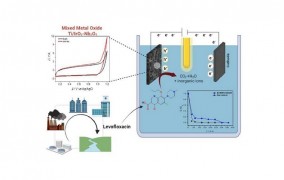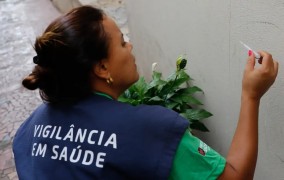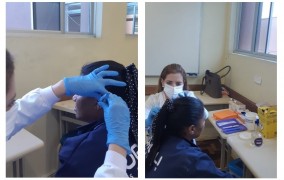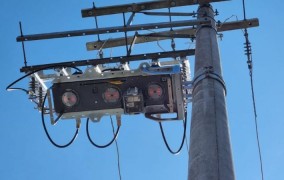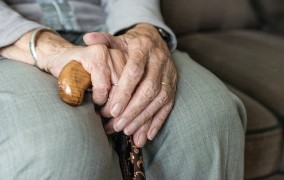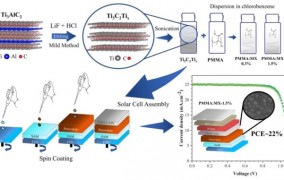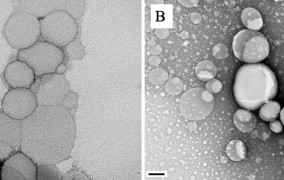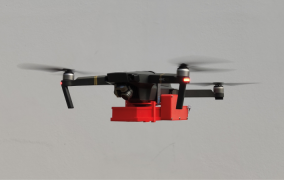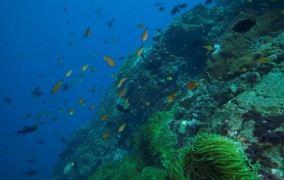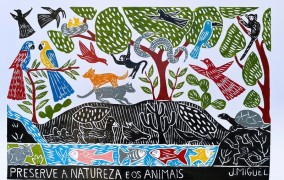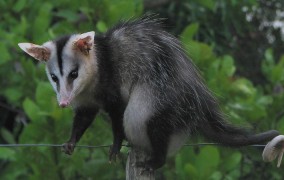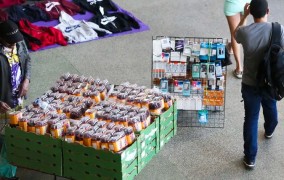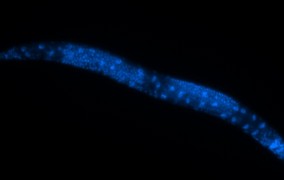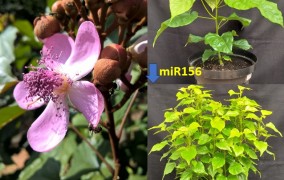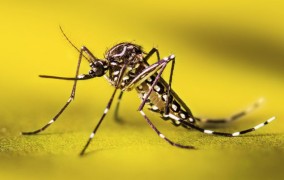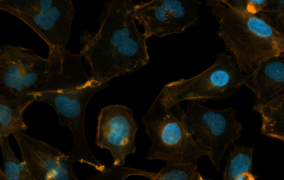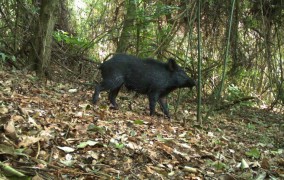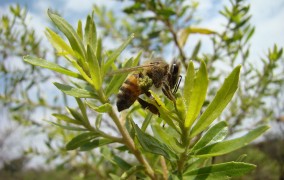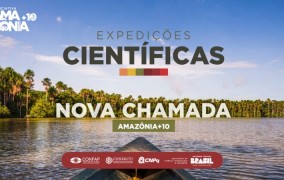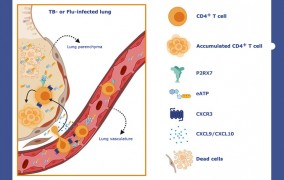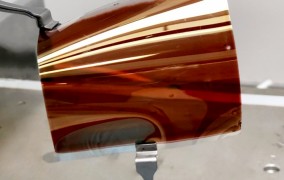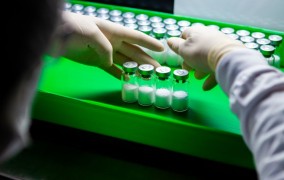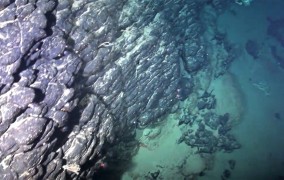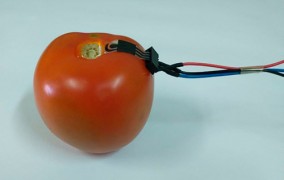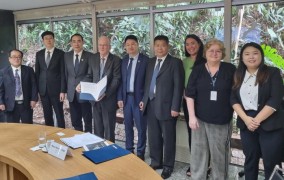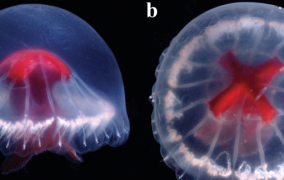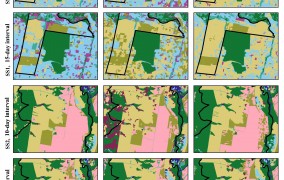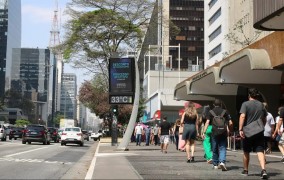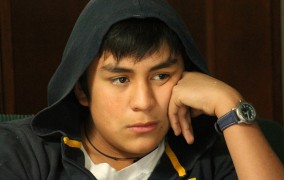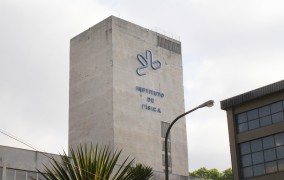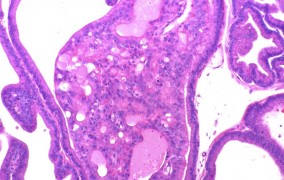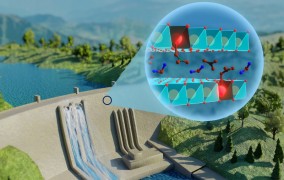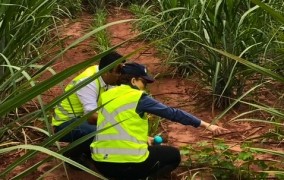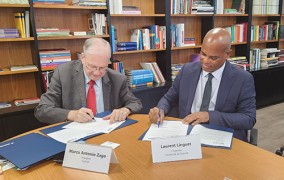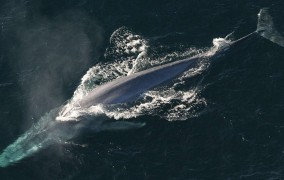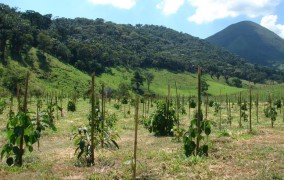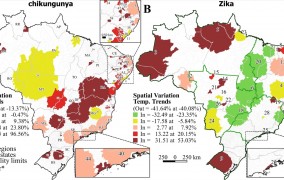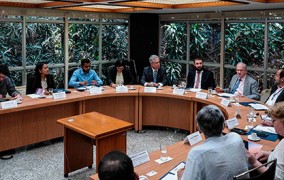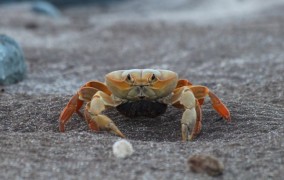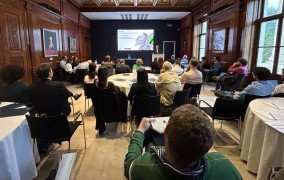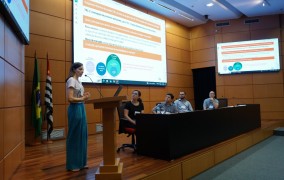
News
-
Prosthetic device developed in Brazil improves results of chest malformation repair surgery
2024-03-06The device was developed by researchers at the University of São Paulo’s Heart Institute (INCOR) and a Brazilian company with FAPESP’s support. It is biocompatible and offers other advantages over the imported product used hitherto. -
Curcumin nanoemulsion is tested for treatment of intestinal inflammation
2024-03-06A formulation developed by Brazilian researchers proved effective in tests involving mice. -
Novel material degrades a widely used antibiotic that contaminates water
2024-03-04An electrode with films of iridium dioxide and niobium oxide on a titanium substrate removed molecules of the drug levofloxacin, considered an emerging pollutant. -
Analysis of photographs of building facades can help map high-risk urban areas for dengue
2024-02-28The methodology was developed by Brazilian and British researchers, who tested it in Campinas, a large city in São Paulo state. Its aim is to optimize monitoring and combating the mosquito Aedes aegypti. -
Study confirms benefits of auricular acupuncture to treat depression
2024-02-28For three months, Brazilian researchers tracked 74 patients submitted to 12 sessions lasting 15 minutes each and observed remission of symptoms. The ancient Chinese practice had no side effects, according to an article on the study published in JAMA Network Open. -
Low-cost equipment helps keep overhead power grid up and running in areas affected by wind and rain
2024-02-28The producer is a company supported by FAPESP. It is developing an advanced three-phase recloser that isolates a section of the grid cut off by a tree fall and lets power be restored remotely. -
Factors that increase risk of frailty in old age are different in men and women
2024-02-28Brazilian and British researchers analyzed data for 1,747 older participants tracked by ELSA over a period of 12 years, and mapped the different routes that can lead to a negative outcome. They advocate use of their findings by policymakers. -
São Paulo School of Advanced Science on Hologenomic Data Analysis for Agriculture is receiving applications
2024-02-28The event will take place in São Carlos (São Paulo state, Brazil) with FAPESP’s support. Twenty participants from Brazil and 20 from other countries will be selected. -
Novel material increases efficiency and stability of perovskite solar cells
2024-02-26The results of a study conducted by researchers at São Paulo State University (UNESP) could be highly positive for the future of the solar power sector. -
Metal in glitter impairs aquatic plant growth, study shows
2024-02-26Researchers at the Federal University of São Carlos found that glitter’s metal coating reduced the amount of light penetrating water bodies and hence impaired photosynthesis by the Large-flowered waterweed Egeria densa. The problem may impact primary producer organisms at the bottom of the food chain, they warn. -
Novel treatment strategy reduces inflammation and cardiometabolic risk in adolescents with obesity
2024-02-21An interdisciplinary approach tested at the Federal University of São Paulo combined clinical, nutritional, psychological and exercise counseling. The intervention involved remote and in-person sessions, favoring adherence and lowering the cost to the health system. -
Nanoparticles containing natural substance treat visceral leishmaniasis with scant side effects
2024-02-21In animal tests conducted at São Paulo State University (UNESP), the strategy reduced spleen and liver parasite numbers by 99.9%. -
Startup based in São Paulo state proposes use of drones to eradicate dengue-carrying mosquitoes
2024-02-21The solution developed by the firm, with FAPESP’s support, permits controlled release of sterile males of Aedes aegypti in urban areas with the aim of reducing the population of these mosquitoes. -
The most comprehensive survey of Brazilian coastal and marine biodiversity conducted to date has been launched
2024-02-21The report was written by 53 academic and government specialists, 12 young researchers, and 26 representatives of Indigenous and traditional communities. It aims to be useful to policymakers and to raise the general public’s awareness of the importance of protecting the ocean and coastline. -
Applications for São Paulo School of Advanced Science on Biodiversity are now being received by State University of Campinas
2024-02-21The event, which is supported by FAPESP, is for young researchers and environmental technicians. Thirty applicants from Brazil and 30 from other countries will be selected. -
Rare case of opossum infected by rabies sounds alarm regarding circulation of this virus in urban environments
2024-02-16The opossum was found dead in a park in the center of Campinas, a large city in São Paulo state (Brazil), with the same viral variant as fruit-eating bats. These mammals are regularly detected in cities, where they are often attacked by dogs, so they can be considered sentinel species for infectious disease surveillance. -
Study highlights importance of genetic sequencing to diagnosis of growth disorders
2024-02-16Researchers at the University of São Paulo analyzed data from 115 children who suffered from conditions considered syndromic (with several associated symptoms) and found a high incidence of overlapping genetic alterations. They argue that identification of genetic mutations can make diagnosis and treatment more accurate. -
Overconsumption of fructose by parents increases risk of cardiometabolic disease in offspring, study shows
2024-02-14Blood pressure rose in offspring born to high-fructose rats, and physiological regulation of their cardiovascular system was impaired. High-fructose syrup is widely used as a sweetener by the food and beverage industry. -
Entrepreneurship on the periphery: between precarious work and the search for a meaningful life
2024-02-14A study conducted in a poor suburb of São Paulo city (Brazil) analyzed how low-income communities deal with the hardships deriving from the economic crisis that began in 2014 and worsened during the pandemic. -
An important molecular pathway for control of aging is discovered
2024-02-14Through experiments in roundworms of the species C. elegans, scientists at a FAPESP-supported research center showed that lifespan is reduced when RNA transfer between cells in different tissues is dysregulated. -
Discoveries can be used to optimize production of annatto powder
2024-02-09A study by Brazilian researchers shows that the pigment is present not only in the seeds but also in other organs of Bixa orellana, the Annatto tree. They investigated the genetic pathways involved in synthesis of the substance. -
Prior zika infection increases risk of subsequent severe dengue and hospitalization, study concludes
2024-02-07A study led by Brazilian researchers suggests that the mechanism that exacerbates dengue infection following a case of zika differs from that acting on second-time dengue patients. The finding is relevant to the development of a zika vaccine. -
Scientists discover that a protein associated with neurodegenerative diseases is also linked to childhood brain cancer
2024-02-07A study conducted at a FAPESP-supported research center discovered a link between the protein VAPB and tumor cell proliferation in medulloblastoma, one of the most common and aggressive brain tumors in children. -
In the Cerrado, crop diversification has beneficial effects on wildlife and reduces the presence of boars
2024-02-07Considered an invasive species, Sus scrofa causes damage to farmers in an important part of Brazil’s savanna-like biome. The researchers analyzed 55 landscapes in São Paulo state, observing larger numbers of native mammals in areas with well-conserved vegetation and diversified crops, while native species richness was far lower in areas of monoculture. -
Study demonstrates antitumor action of substance present in Brazilian green propolis
2024-02-07The analysis compared the effects of artepillin C on healthy cells and cancer cells, as well as the effects on its efficacy of variations in the medium’s pH. -
United Kingdom, Switzerland and Germany join new call for proposals issued by Amazon+10 Initiative
2024-02-07With the new contributions from abroad, the Scientific Expeditions call, issued in partnership with the National Council for Scientific and Technological Development, now has a fund totaling some BRL 94 million. -
Study reveals mechanism that aggravates tuberculosis and reduces survival rates
2024-02-07CD4+ T cells play an important role in the immune response to pulmonary infections, but excessive amounts can damage the lungs. In experiments with mice, researchers at the University of São Paulo discovered what leads to this exacerbated response. -
Startup achieves success with machine that produces thin films from soluble materials with many applications
2024-02-07The startup has been supported by FAPESP since its foundation in 2020. The device can be used to make film for perovskite solar cells, biomaterials for wound dressings and tissue regeneration, and novel drug and cosmetic delivery systems. -
Butantan Institute’s dengue vaccine protects 79.6% of those vaccinated, study shows
2024-02-01Data from the Phase 3 clinical trial was published on February 1st in The New England Journal of Medicine. The vaccine is safe for both participants who have had dengue and those who have never been exposed to the virus before. -
Study shows that Rio Grande Rise was once a giant mineral-rich tropical island near Brazil
2024-01-31This part of the seafloor in the South Atlantic is rich in cobalt, nickel and lithium, as well as tellurium and other rare earths critical to the energy transition. The scientists plan to continue research on its natural processes as a contribution to prospecting efforts. -
Biodegradable sensor monitors levels of pesticides via direct contact with surface of fruit and vegetables
2024-01-31Developed by a team of Brazilian researchers, the device is made of plant-based material with little environmental impact, and detects pesticides in a few minutes, helping to certify food safety. -
FAPESP signs agreement with China-Latin America and Caribbean Technology Transfer Center
2024-01-31The aim is to foster scientific and technological collaboration between researchers affiliated with the Chinese entity and colleagues at universities and research institutions in São Paulo state. -
Brazilian researcher helps describe a novel species of jellyfish discovered in a remote location in Japan
2024-01-31André Morandini, Director of the University of São Paulo’s Center for Marine Biology, was on the team that has published a description of a rare medusa found at a depth of 812 meters. The animal has been sighted only twice in a deep-sea volcanic structure called Sumisu Caldera, in the Ogasawara Islands. -
Method combines artificial intelligence and satellite imagery to map crop-livestock integration systems
2024-01-31The study, which was conducted by Brazilian researchers, supports sustainable agriculture and offers contributions to public policy formulation. -
Cancer: mortality is higher among Black people in Barretos (São Paulo state, Brazil) and among White people in São Paulo city
2024-01-31In 18 cities of the Barretos region, where the proportion of Black people in the population is smaller, cancer kills more members of this ethnic group, whereas in the capital of the same state, it kills more White people, according to a study that compares cancer mortality rates and points to ways of reducing inequalities in diagnosis and treatment. -
System based on Brazilian technology monitors industrial networks
2024-01-31The platform, developed by a company based in São Carlos (São Paulo state, Brazil) and supported by FAPESP, is able to predict and permit correction of failures in order to avoid unplanned factory production line downtime. -
Study helps explain why stress in adolescence can lead to predisposition to mental illness in adulthood
2024-01-24In experiments with rats, researchers at the University of São Paulo analyzed brain tissue and detected alterations in genes associated with energy metabolism. -
Applications are open for the São Paulo School of Advanced Science on Quantum Materials
2024-01-24The event will take place on July 16-26 at the University of São Paulo’s Physics Institute, for 100 graduate students and/or young researchers, half from Brazil and half from other countries. -
Study explains why protein-poor diet during pregnancy increases risk of prostate cancer in offspring
2024-01-24In experiments with rats, researchers at São Paulo State University detected changes in the expression of more than 700 genes in offspring. One of these genes is known to be associated with prostate cancer. -
Novel material facilitates measurement of concrete deterioration in buildings and other structures
2024-01-24The material is a compound similar to clay and enables inspectors to carry out in-situ assessment of structural conditions in buildings, bridges, dams and other structures without having to drill for samples and analyze them in a laboratory. -
Computational tool processes data to produce predictive analysis for agribusiness
2024-01-24The solution, which was developed via a project supported by FAPESP, aims to help farmers assess risks and forecast future prices. -
FAPESP signs scientific and technological cooperation agreement with University of French Guiana
2024-01-24The two parties are interested in collaborative research on sustainable use of biodiversity in the Amazon, prevention of transmissible and chronic diseases, and sustainable construction, among other subjects. -
Study of gigantism in whales provides clues to genomic mechanism involved in tumor suppression
2024-01-22Some species of cetacean are up to 4 meters in length, while others reach 30 meters. According to researchers at the State University of Campinas, genes that favor the colossal growth of these mammals also inhibit the development of cancer. -
Novel methodology projects growth of native trees, enhancing return on investment in forest restoration
2024-01-17The study analyzed data for 13 Atlantic Rainforest restoration areas involving ten species of native trees that could be commercially useful to the timber industry. Publication of the findings comes during the UN Decade on Ecosystem Restoration. -
Cases of chikungunya and zika fall in Brazil, but most risk clusters exhibit an upward trend
2024-01-17Researchers at the University of São Paulo and São Paulo state’s Center for Epidemiological Surveillance observed spatial and temporal patterns of occurrence and co-occurrence for the two arboviral diseases in all Brazilian municipalities, alongside the influence of environmental and socio-economic factors. -
ASEAN delegation meets with senior executives of FAPESP to discuss ways of intensifying research and innovation partnerships
2024-01-17Indonesia, Malaysia, Philippines, Singapore Thailand and Vietnam have dynamic economies and similarities with Brazil that make collaboration particularly relevant. -
A single session of aerobic exercise improves blood pressure in rheumatoid arthritis patients
2024-01-17A study involving 20 women with rheumatoid arthritis and high blood pressure demonstrates the benefits of walking at moderate speed for 30 minutes even after tests that simulate stressful situations and tend to raise blood pressure. -
Study identifies priority areas for conservation of endangered crustacean in Brazil
2024-01-17The land crab Johngarthia lagostoma occurs only on four ocean islands, three of which are in Brazil, but little is known of its natural history. Brazilian researchers discovered that a hill and beach on Trindade Island play a key role in the species’ reproductive cycle and survival. -
FAPESP and UK’s Royal Society hold bilateral meeting in London
2024-01-17The purpose of the event was to build ties and foster collaboration between researchers in São Paulo state and the United Kingdom. -
Startups present results of projects conducted under aegis of Centelha SP program
2024-01-17Representatives of 44 startups based in São Paulo received technical support for a year to develop products and business plans via in-person training, mentoring and workshops run by experts from FAPESP and associations that foster entrepreneurship.
Most popular
-
Study identifies molecular alterations in brain tissue and blood of people who committed suicide
2024-03-13
-
Study helps explain why stress in adolescence can lead to predisposition to mental illness in adulthood
2024-01-24
-
Study shows that Rio Grande Rise was once a giant mineral-rich tropical island near Brazil
2024-01-31
-
Butantan Institute’s dengue vaccine protects 79.6% of those vaccinated, study shows
2024-02-01
-
Brazilian researcher helps describe a novel species of jellyfish discovered in a remote location in Japan
2024-01-31
-
Growth hormone influences regulation of anxiety via a specific group of neurons
2024-01-02
-
Amphibians use scream inaudible to humans for self-defense against predators, study suggests
2024-04-03
-
Biodegradable sensor monitors levels of pesticides via direct contact with surface of fruit and vegetables
2024-01-31
-
Weight training improves symptoms of anxiety and depression in old people, study confirms
2024-04-10
-
Study reveals evidence of violence at a time of crisis in ancient Peru
2024-03-27





